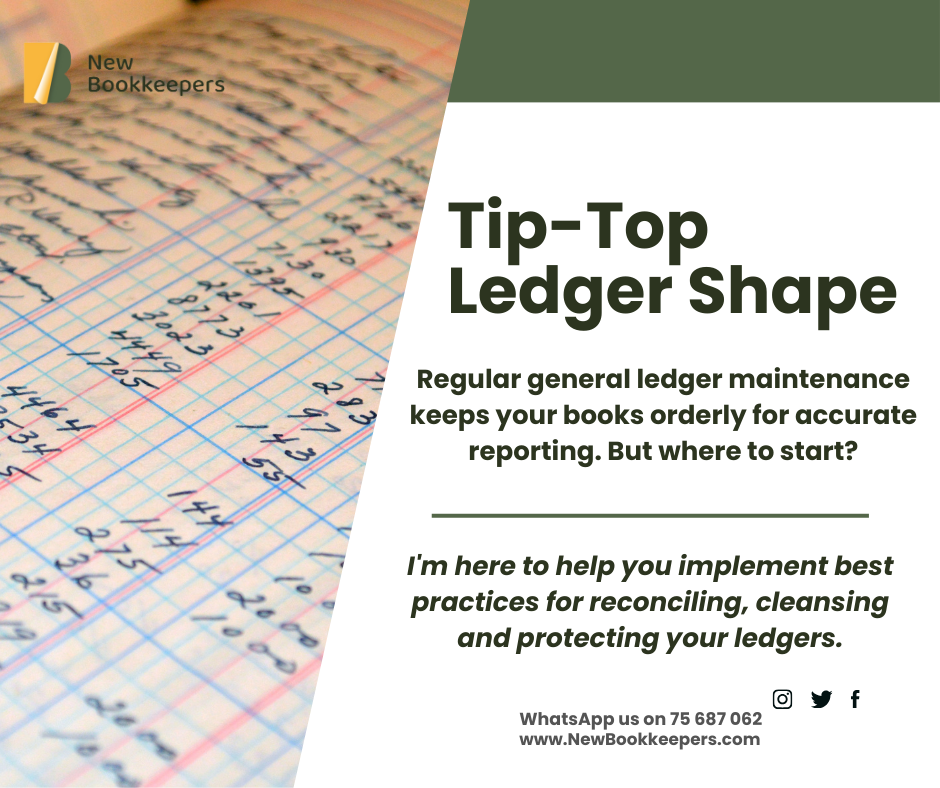Keeping Your Books in Tip-Top Shape: A Guide to General Ledger Maintenance

As a bookkeeper, the general ledger is at the heart of your record-keeping. This central repository documents every business transaction and allows you to produce financial statements, track accounts, and monitor cash flow. Given its importance, it’s critical to maintain your general ledger properly so it remains accurate and up-to-date.
General ledger maintenance might sound tedious, but think of it as giving your books a regular check-up to keep them healthy. Just some periodic TLC goes a long way! Here are some best practices to follow:
Perform Regular Reconciliations
One of the key aspects of general ledger maintenance is reconciling your accounts. This simply means cross-checking account balances from your general ledger against third-party statements from vendors, clients, banks, credit card companies, and so on. You’ll want to tie out monthly bank and credit card reconciliations at minimum. Carefully investigate any discrepancies and make adjustments or corrections as needed in your accounting system. Getting into the habit of regular reconciliations helps catch errors early.
Review for Unusual Balances
While reconciling, also scan for any abnormal account balances. Are there outliers that seem excessively high or low? Do some accounts show debit balances rather than credit (or vice versa)? Tracing down the source transactions causing these irregularities helps ensure the accuracy of your general ledger. Remember that an imbalance in one account can throw off the books across the board if left unchecked.
Enter Transactions Properly
Making sure every transaction hits the right general ledger accounts is critical for maintenance. Consistently following proper posting protocols and double-checking your work helps mitigate errors that would require corrections down the road. Get clear guidelines from your clients upfront on how they want transactions coded if you’re unsure. Ask questions when needed – it’s better than guessing and posting incorrectly.
Clean Up Old Records
Part of general ledger best practices is keeping your books clean and orderly. Just like tidying up around the house, take time periodically to clear out outdated, unnecessary transactions cluttering up your general ledger. End-of-year cleanup might include reclassifying old unused accounts, removing closed purchase orders or invoices, and deleting temporary journal entries. Consult your accounting system guides for archiving or deleting protocols. It might seem tedious but helps optimize performance.
Back Up Regularly
Technology enables greater efficiency with bookkeeping today – yet with reliance on computers comes the risk of crashed hard drives, corrupted data, or compromised cybersecurity. That’s why maintaining regular back-ups of your general ledger is a must. Determine the right back-up frequency based on transaction volume. Many systems have auto-save settings you can customize as well. Store back-ups both locally and in the cloud for maximum protection. Test restoring files occasionally to ensure the back-ups work properly.
Watch for Fraud
Along with accidental errors, bookkeepers must also keep fraud top of mind in ledger maintenance. The ACFE estimates businesses lose 5% of revenues each year to fraud, so risk-mitigation matters. Be alert when reconciling for suspicious transactions like ghost vendors or employees, large payments to unknown accounts, and altered supporting docs. Dig deeper when your instinct tells you something seems off. It’s not about distrusting your clients or team members – it’s guarding against victimization from potential bad actors.
In Summary…
Like changing oil in your car, general ledger maintenance might not be the most fascinating activity but shouldn’t be neglected. Regular care and attention prevents problems and keeps your books rolling smoothly for clients. Reconcile statements, fix errors, clean up data, back up files and watch for fraud – make these actions part of your standard operating procedures. Mastering ledger maintenance not only safeguards accuracy but builds confidence for advancing your bookkeeping career. The fundamentals matter – handle them well as either a new or seasoned pro.
As a bookkeeping coach, I’m here to support your development. Please reach out if you need any guidance on implementing general ledger best practices for your business clients or within your own firm. Proper maintenance seems basic but is crucial for all bookkeeping success. Let me know how I can help!
